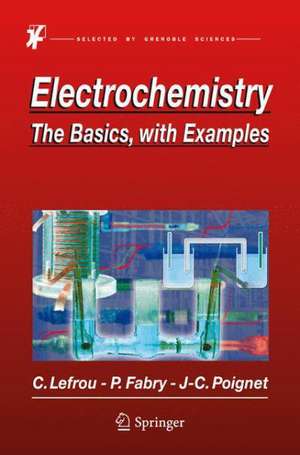Electrochemistry: The Basics, With Examples
Autor Christine Lefrou, Pierre Fabry, Jean-Claude Poigneten Limba Engleză Hardback – 25 mai 2012
This book features:
- Questions and answers for self-assessment
- Basic and advanced level numerical descriptions
- Illustrated electrochemistry applications
This book is accessible to both novice and experienced electrochemists and supports a deep understanding of the fundamental principles and laws of electrochemistry.
| Toate formatele și edițiile | Preț | Express |
|---|---|---|
| Paperback (1) | 497.37 lei 6-8 săpt. | |
| Springer Berlin, Heidelberg – 23 aug 2016 | 497.37 lei 6-8 săpt. | |
| Hardback (1) | 574.39 lei 38-44 zile | |
| Springer Berlin, Heidelberg – 25 mai 2012 | 574.39 lei 38-44 zile |
Preț: 574.39 lei
Preț vechi: 709.13 lei
-19% Nou
Puncte Express: 862
Preț estimativ în valută:
109.94€ • 119.46$ • 92.41£
109.94€ • 119.46$ • 92.41£
Carte tipărită la comandă
Livrare economică 17-23 aprilie
Preluare comenzi: 021 569.72.76
Specificații
ISBN-13: 9783642302497
ISBN-10: 3642302491
Pagini: 372
Ilustrații: XVI, 353 p.
Dimensiuni: 167 x 248 x 26 mm
Greutate: 0.75 kg
Ediția:2012
Editura: Springer Berlin, Heidelberg
Colecția Springer
Locul publicării:Berlin, Heidelberg, Germany
ISBN-10: 3642302491
Pagini: 372
Ilustrații: XVI, 353 p.
Dimensiuni: 167 x 248 x 26 mm
Greutate: 0.75 kg
Ediția:2012
Editura: Springer Berlin, Heidelberg
Colecția Springer
Locul publicării:Berlin, Heidelberg, Germany
Public țintă
GraduateCuprins
Chapter 1: Basic notions.- Chapter 2: Simplified description of electrochemical systems.- Chapter 3: Thermodynamic features.- Chapter 4: Current flow: a non-equilibrium process
Notă biografică
Christine Lefrou is a graduate of ENS (Ecole Normale Supérieure), the elite French institution of higher education and research, and currently a university lecturer at the PHELMA engineering school (Physics, Applied Physics, Electronics and Materials Science), part of the Grenoble Institute of Technology (INP). She teaches electrochemistry on core education courses, as well as on a wide array of continuing education courses. Her research work to date has mainly focused on applying the concept of modeling material transport to the field of electrochemistry (batteries and electroanalysis).
Pierre Fabry is a university-trained physicist, who was formerly a professor at Grenoble University (Université Joseph Fourier). He has taught electrochemistry and the structure of materials at university level, (undergraduate and master’s degrees) as well as at engineering schools, and on adult training courses. His research work has focused specifically on the subject of electrochemical solids for high-temperature energy storage systems and electrochemical sensors for biomedical and environmental applications.
Jean-Claude Poignet was formerly a Professor of electrochemistry at the Grenoble Institute of Technology (INP). After completing a thesis on the structure and transport properties of molten salts, he then focused his research career on studying low temperature ionic liquids, before turning his attention towards electrochemistry of molten salts between 450 and 1000°C: electrode and electrolyte materials for thermal batteries, Li or Na solutions dissolved in molten LiCI or NaCI, the cathodic separation of lanthanides and actinides and the electrosynthesis of Na, Al, Nb and Pu
Pierre Fabry is a university-trained physicist, who was formerly a professor at Grenoble University (Université Joseph Fourier). He has taught electrochemistry and the structure of materials at university level, (undergraduate and master’s degrees) as well as at engineering schools, and on adult training courses. His research work has focused specifically on the subject of electrochemical solids for high-temperature energy storage systems and electrochemical sensors for biomedical and environmental applications.
Jean-Claude Poignet was formerly a Professor of electrochemistry at the Grenoble Institute of Technology (INP). After completing a thesis on the structure and transport properties of molten salts, he then focused his research career on studying low temperature ionic liquids, before turning his attention towards electrochemistry of molten salts between 450 and 1000°C: electrode and electrolyte materials for thermal batteries, Li or Na solutions dissolved in molten LiCI or NaCI, the cathodic separation of lanthanides and actinides and the electrosynthesis of Na, Al, Nb and Pu
Textul de pe ultima copertă
This textbook offers original and new approaches to the teaching of electrochemical concepts, principles and applications. Throughout the text the authors provide a balanced coverage of the thermodynamic and kinetic processes at the heart of electrochemical systems. The first half of the book outlines fundamental concepts appropriate to undergraduate students and the second half gives an in-depth account of electrochemical systems suitable for experienced scientists and course lecturers. Concepts are clearly explained and mathematical treatments are kept to a minimum or reported in appendices.
This book features:
- Questions and answers for self-assessment
- Basic and advanced level numerical descriptions
- Illustrated electrochemistry applications
This book is accessible to both novice and experienced electrochemists and supports a deep understanding of the fundamental principles and laws of electrochemistry.
This book features:
- Questions and answers for self-assessment
- Basic and advanced level numerical descriptions
- Illustrated electrochemistry applications
This book is accessible to both novice and experienced electrochemists and supports a deep understanding of the fundamental principles and laws of electrochemistry.
Caracteristici
A two level approach with a first level providing a smooth introduction to the subject and a second level providing a more in depth coverage of the topic Problems and solutions included A breadth of topics including electrochemistry in liquid and solid systems Mathematical treatments are kept to a minimum or reported in appendices Includes supplementary material: sn.pub/extras Includes supplementary material: sn.pub/extras
